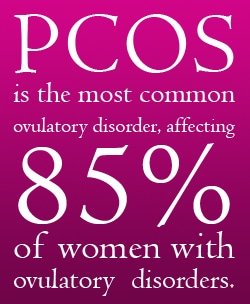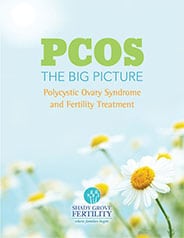
Polycystic ovary syndrome, or PCOS, is one of the most common ovulatory disorders, accounting for 85 percent of ovulatory disorder cases. While the exact causes of PCOS remain unclear, what is known are the effects PCOS can have on your body and a woman’s fertility. Women with PCOS create a higher than normal level of androgens. Androgens are normally present in both sexes, but typically considered “male hormones.” Elevated levels in women will impact the development of eggs and interfere with ovulation. For this reason, women with PCOS will not ovulate with regularity, if at all.
While a cure for PCOS does not currently exist, a woman can manage the symptoms through medication and, if conception does not occur on her own, it often can be achieved through fertility treatment. Many patients are surprised to learn even the most basic treatment options like clomiphene citrate (Clomid) with timed intercourse or intrauterine insemination (IUI) can help couples become pregnant.
To help spread the word about polcystic ovary syndrome—a condition that, according to the World Health Organization is believed to impact 116 million women worldwide—this month is dedicated to raising awareness, educating the public, and conquering PCOS by sharing personal stories.

To help with this effort, SGF created an eBook to inform and help educate men and women, covering topics such as common symptoms, how PCOS is diagnosed, the impact it has on fertility, treatment options, and the success rates associated with fertility treatment. In addition, the eBook concludes with three inspiring patient stories of triumph and success.
The other important aspect of PCOS Awareness Month is advocacy. Whether it’s by sharing your individual fertility story or supporting other women struggling with PCOS, this month gives all of us a platform to join the conversation. Share your experiences with our online community on our Facebook page or share your story directly with us to empower and uplift other women struggling with PCOS or any other type of infertility.
If you would like to learn more about polycystic ovary syndrome or to schedule an appointment, please speak with one of our New Patient Liaisons at 877-971-7755.





